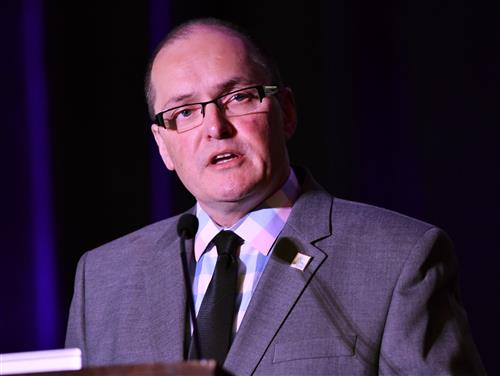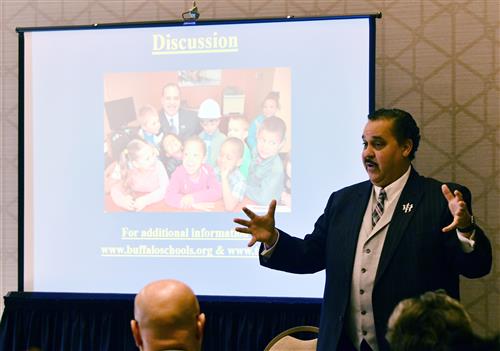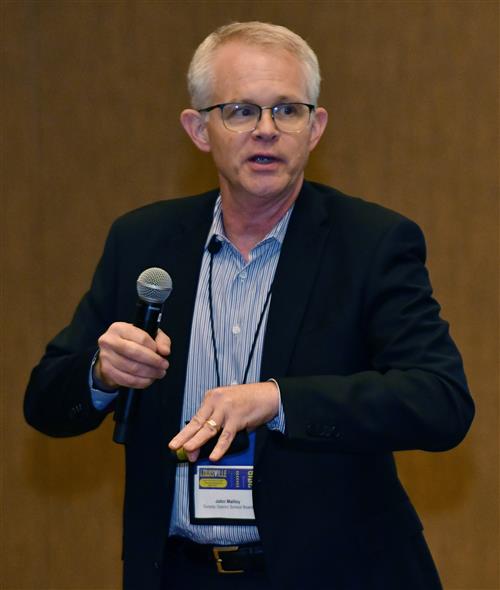- Council of the Great City Schools
- Council Chair Welcomes Conferees to Louisville
Digital Urban Educator- Nov/Dec 2019
Page Navigation
- Large City Schools Making Positive Progress in Reading and Math on National Test
- 2020 Census Concerns, Strategies Get Airing at Town Hall Meeting
- Former Obama Adviser, Best-Selling Author, and 2019 National Teacher of the Year Address Council
- Historian Jon Meacham Urges Educators to Prevail
- National Teacher of the Year Urges Equity for All Children
- Miami-Dade Schools Board Member Recognized as Urban Superintendent of the Year
- Santa Ana Names New Superintendent, St. Louis Leader Inducted Into Hall of Fame
- Legislative Column
- Council Releases New Academic KPI Report and Managing for Results Reports
- Council Chair Welcomes Conferees to Louisville
- 63rd Annual Fall Conference Pictorial
- 2020 Census Campaign Launches in Memphis
- Voters Decide on Education Ballot Issues
- Principals in NYC, Hawaii and Dallas Receive National Honors
- Urban Schools Top the List of Newsweek Best STEM High Schools
- Two Districts Win Council Awards
Council Chair Welcomes Conferees to Louisville
-
LOUISVILLE, Ky.--Eric Gordon, chair of the Council of the Great City Schools’ Board of Directors, called on urban educators to “critically examine our current structures, policies and practices from the lens of structural racism.”
“Courageous conversations that are not coupled with courageous actions are simply not enough,” Gordon said in his speech welcoming conferees to the Council’s 63rd Annual Fall Conference. “Instead, if we are going to make real, lasting change, we must also critically examine our current structures, policies and practices from the lens of structural racism and advocate for the changes needed to dismantle those systems that by their very design promote racial discrimination.”

As an example, Gordon, CEO of the Cleveland school system, with 39,000 students, described how graduation criteria adopted in Ohio in 2014 to ensure students were “college ready” would have had a devastating impact on students in his district, 84 percent of whom are children of color. By some estimates, 20 percent fewer Cleveland students would have won a diploma – what he termed the “access document” essential for jobs and admission to college and technical programs.
“This would have essentially guaranteed another generation of minority men and women would remain trapped in poverty, even while thousands of jobs would remain unfilled across the state,” he said. After much lobbying, Ohio legislators revised the high-stakes diploma rules to reduce the dramatic inequitable impact on underprivileged youth.
He urged his fellow educators to “use what power we have … to tackle the systems that reinforce those differentials.”
Breakout Sessions
The Council’s Fall Conference featured more than 70 breakout sessions. Here are highlights from three of those sessions.
Fresno, Houston and Clark County Employ District-Wide Strategies
California’s Fresno Unified School District added time to the day, Nevada’s Clark County School District embraced metrics and community support, and the Houston Independent School District opted for an expansive “Achieve 180” turnaround plan. The three districts made presentations at a session titled, “Winning Strategy: Districtwide Approaches for Increasing Urban Student Performance.”
Fresno has added 30 minutes of instruction to the day at 40 elementary schools with high numbers of students from socioeconomically disadvantaged families and teachers have received additional professional development as well as a pay bump.
Houston’s Achieve 180 aimed to improve principal and teacher effectiveness in 27 schools needing improvement and after two years, 17 of those schools had moved off the state’s “improvement required” list. The plan has six pillars: leadership, teaching, instruction, school design, social/emotional learning support, and family and community involvement. “We’re seeing a lot more growth,” said Carla Stevens, assistant superintendent, research and accountability.
In Clark County, superintendent Jesus Jara developed a five-year strategic plan with community and business input and research-based strategies. “Our view is, if it’s not working, we’re not going to do it anymore. I don’t care who’s pet project it is,” Jara said, with the focus now on student achievement. “We do not talk about ice machines or vending machines at our principal meetings anymore,” he said.
Buffalo, Jefferson County and Shelby County Share Strategies for Supporting Males of Color
New York’s Buffalo Public Schools, Kentucky’s Jefferson County Public Schools and Shelby County Schools in Memphis shared their strategies for achieving equity for males of color in a session focusing on knocking down barriers to success for youth of color.
Buffalo has signed onto the national My Brother’s Keeper Alliance first proposed by President Barack Obama to address persistent opportunity gaps facing boys and young men of color. Key components of Buffalo’s approach include creating a culturally relevant curriculum, keeping schools open longer including on weekends, and expanding opportunities for mentoring and internships.

The W.E.B. DuBois Academy of Excellence opened in 2018-19 in Louisville as an innovative all-male middle school with an Afrocentric and multicultural curriculum. “We all have schools for black boys,” said John Marshall, Jefferson County Public Schools chief equity officer. “We need to have schools of excellence for black boys,”
In Shelby County Schools Superintendent Joris Ray has launched the African American Male Empowerment Initiative with multiple elements. They include using restorative practices, recruiting African American male teachers, and the opening of a new equity office. “Our African American males need our attention right now,” Ray said.
Toronto and New York City Describe Effective Equity Practices
Educators from Canada’s Toronto District School Board and the New York City Department of Education shared insights from their efforts to develop effective equity practices in their large school districts.
John Malloy, who as director of education runs the Toronto district, began with an admission. “We Canadians are polite, we are kind. And we struggle when the conversation gets uncomfortable,” he said. Toronto is the largest school district in Canada, with 246,00 students and nearly 600 schools.
Efforts to raise awareness around anti-black racism and discrimination affecting indigenous students are ongoing, Malloy said. Recently, the district has published an Equity Leadership Competencies document describing expectations for school leaders.
New York is even bigger, with more than 1.1 million students and 1,800 schools. The New York Equity and Excellence for All agenda includes 3-K and pre-K for all, emphasis on computer science, literacy and algebra for all students, and college access programs beginning in middle school.
There was agreement that implicit bias among staff and microaggressions in the workplace are of ongoing concern. “The community is now holding us accountable,” said Paul Forbes, executive director of educational equity in New York.

Media Contact:
Contact Name
Contact@email.com
(000) 000-0000
Contact Name
Contact@email.com
(000) 000-0000
Contact Name
Contact@email.com
(000) 000-0000
Media Contact:
Contact Name
Contact@email.com
(000) 000-0000
Contact Name
Contact@email.com
(000) 000-0000
Contact Name
Contact@email.com
(000) 000-0000


